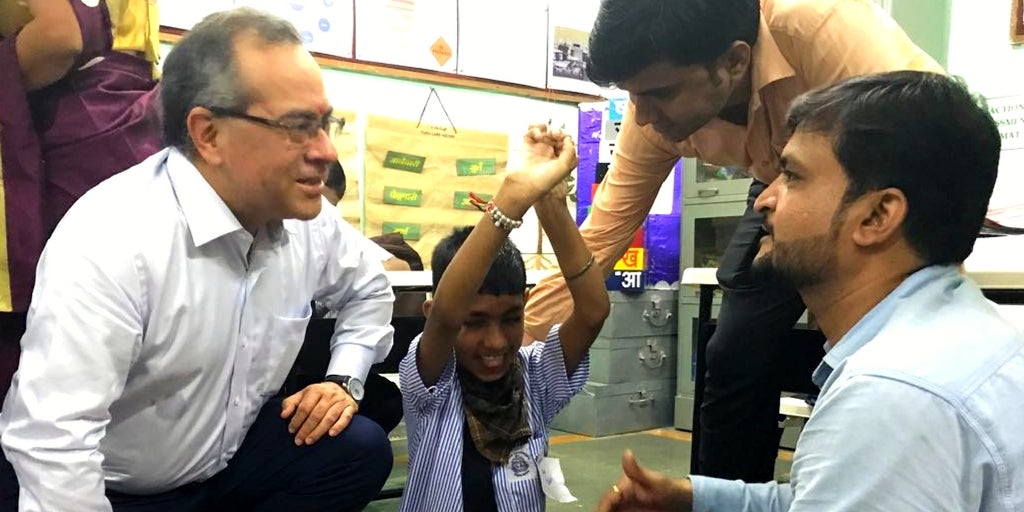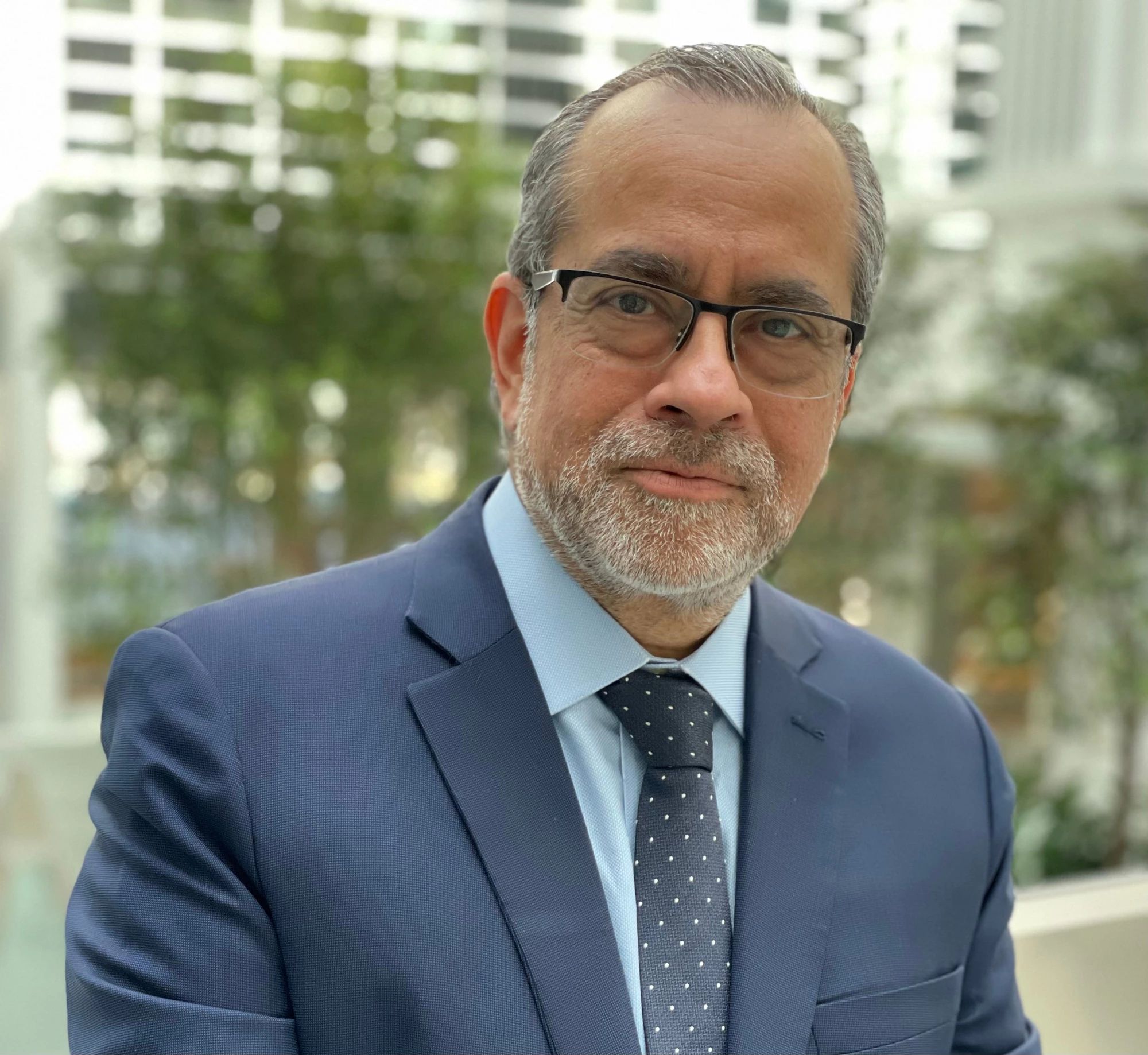
In India, Jaime spoke to teachers who have dedicated their lives to the education of students with special needs at the Dharabi Transitional Municipal School Corporation College. (Photo: Marcela Gutierrez Bernal/ World Bank)
Last Wednesday, the World Development Report 2018, Learning to Realize Education’s Promise (WDR) was released. It argues that there is a learning crisis: in many developing countries, children learn very little, educational opportunities are unequal, and educational progress is still very slow. What do we need to change this? We need prepared learners, who receive adequate nutrition and stimulation in their early years. We need well managed schools that create an environment conducive to learning. We need adequate inputs so that schools can operate effectively. But above all, we need motivated and well-prepared teachers. In classrooms around the world, white boards and screens have replaced black boards and notebooks are increasingly commonplace. But in this 21st century, with increased use of technology, there is one constant that determines, more than anything else, whether children learn at school: teachers. Indeed, teachers remain central to the classroom experience. And yet in many countries, the teaching profession needs attention and reform.
There are millions of well-prepared teachers who are brilliant mentors—and friends— to their many students. These women and men inspire and change lives. With limited resources and minimal government support, they use their creativity and passion to motivate and engage their students. Often, they invest their personal time and money to buy and prepare materials for class. Teachers like the one I met in Jamestown, a fishing village in Accra, Ghana, who painted walls and school furniture on a Sunday with the help of young volunteers and students to make the school a more welcoming space. Brave civil servants, like the principal I met in Moquegua, a small city in Southern Peru, who reported parents to the authorities for abandonment because she was tired of them missing their parent-teacher meetings. Across the world, there are teachers who give their all to ensure schools stay open and children experience the magic of learning. For many, that is what teaching is all about: inspiring hope that everything is possible. Believing in their students and in themselves.
However, there are also teachers who are in a classroom because it was the only job they could find. Some others want to do a good job but are continuously worried about getting to their other job on time which they need to sustain their families. And there’s a small number—albeit a minority—who use their profession for political ends, with little interest in the students they are tasked with teaching. As in any profession, some teachers are exceptional, some are good, and others are subpar. However, the importance of teachers in a student’s life is such that every one of us remembers that teacher who motivated us and changed our lives, as well as the one that was not so good and made us feel bad.
Scientific evidence regarding the effects of teacher quality is clear: a good teacher makes all the difference. In the United States, students in a class with an effective teacher advance 1.5 grade levels or more over a single school year, compared with just 0.5 grade levels for those with an ineffective one. Effects of similar size are seen in Pakistan. The bottom line is that countries need to increase the share of teachers that inspire, that help children acquire basic reading and math competencies, as well as more complex ones such as critical thinking and the capacity to learn permanently, and that work with students to build socio-emotional skills (grit, communication, creativity, etc.). The question we face as a global community is: how can we work together to support teachers?
First, teachers and society at large must value teaching as a respected and challenging career. One where a constant drive for excellence accompanies the potential for deep personal satisfaction. Teaching is never merely a job to collect a salary at the end of the month. It is a career of outmost responsibility, where the citizens of the future are forged. It is hardly coincidental that in countries with exceptional educational systems (such as Finland, Singapore, and South Korea), teachers are held in very high esteem.
Second, in line with increasing the social recognition of the teaching profession, salaries should ensure teachers are able to dedicate themselves to their students without worrying about securing a supplemental income. We will achieve high-quality education when the salary for an experienced teacher is on par with that of a good lawyer, architect, or engineer with comparable experience. This is not a pipe dream: in South Korea, Spain, and Hong Kong teachers’ salaries are around the median of professional wages. Teacher will not be millionaires, but in many OECD countries teacher salaries are comparable to those of other professionals.
As a corollary to compensating teachers appropriately, entry into the teaching profession should be rigorous and meritocratic. A quality education system needs teacher training institutions that are highly demanding and that have competitive admissions requirements. For example, those who study pedagogy in South Korea are amongst the top decile of high school graduates. Only one out of every twenty passes the admission exam for the teaching career. This is also the case in Singapore, Japan and Taiwan. As the WDR notes, the a key mechanism to strengthen teacher ability and motivation in the long run may be to attract capable and motivated people into the profession.
Additionally, given that the future of our countries relies on our teachers, their professional advancement should depend on their achievements. Career advancement for teachers should be based on their performance, their pedagogic and content matter knowledge and their students’ learning outcomes, rather than seniority or the accumulation of certifications. There is clear evidence that certification and diplomas do not ensure higher teaching effectiveness. Nor does experience, except the first years in the classroom. Moreover, job stability for teachers should be linked to performance, rather than tenure-like government contracts as seen in myriads of countries.
Teachers should have ample opportunities for professional development. On one hand, their training must be aligned to the needs of children in today´s world. Although universities are autonomous and cannot—and should not—be forced to follow a specific curriculum, the State, as the main employer, can set minimum skill and knowledge requirements for teachers. Those minimum requirements will immediately boost overall teacher quality. For example, given that they are asked to instill critical thinking in their students, they should be trained as critical thinkers too. On another hand, teacher training should not only be based on traditional methods in which plenty of resources are invested. The most successful experiences use coaches that work hand-in-hand with teachers, in a personalized way, and provide guidance based on their specific needs and with pedagogical and content knowledge that is immediately useful in the classroom. In Shanghai, teachers permanently participate in research and teaching groups, receiving feedback and mentorship from their peers in a process that includes classroom observation.
Peru and Kenya are examples of countries where teachers’ salaries are rising as the same time as a merit-based approach is being introduced into the profession. In both countries, reforms have already started, though results may take several more years. In Peru, the 2012 Teachers’ Career Reform Law increased teachers’ salaries, enhanced payment transparency, and made promotion dependent on the results of teacher performance, achievements and knowledge. In Kenya, through the Teacher's Service Commission (TSC), the government is working towards assessing teachers based on their professional knowledge, their time management, their innovation and creativity in teaching, job performance, and other factors. The evaluation tool is relatively new (2016) and is currently being reviewed so that it can be refined based on teachers’ feedback.
A country’s education is only as good as its teachers. Reforms that empower teachers to be more effective and increase the social recognition of the profession are complex, but critical. If we set higher standards for teachers and at the same time, value, select, train, and reward them accordingly, we will see real and sustained changes in the classroom. Our future depends on it.
Find out more about World Bank Group Education on our website and on Twitter.
Read about our work with teachers.
VIDEO: Students tell us why teacher matter.


Join the Conversation